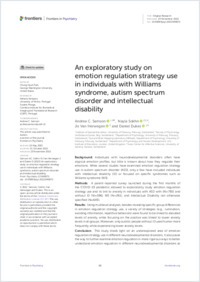An exploratory study on emotion regulation strategy use in individuals with Williams syndrome, autism spectrum disorder and intellectual disability
IPC
- Samson, Andrea C. ORCID Institute of Special Education, University of Fribourg, Fribourg, Switzerland. Faculty of Psychology, UniDistance Suisse, Brig, Switzerland
- Sokhn, Nayla ORCID Faculty of Psychology, UniDistance Suisse, Brig, Switzerland. Department of Psychology, University of Fribourg, Fribourg, Switzerland. Eye and Brain Mapping Laboratory (iBMLab), Department of Psychology, University of Fribourg, Fribourg, Switzerland
- VanHerwegen, Jo ORCID Department of Psychology and Human Development, UCL Institute of Education, London, United Kingdom
- Dukes, Daniel ORCID Institute of Special Education, University of Fribourg, Fribourg, Switzerland. Swiss Center for Aective Sciences, University of Geneva, Geneva, Switzerland
- 23.11.2022
Published in:
- Frontiers in Psychiatry. - Frontiers Media SA. - 2022, vol. 13
English
Background: Individuals with neurodevelopmental disorders often have atypical emotion profiles, but little is known about how they regulate their emotions. While several studies have examined emotion regulation strategy use in autism spectrum disorder (ASD), only a few have included individuals with intellectual disability (ID) or focused on specific syndromes such as Williams syndrome (WS).
Methods: A parent-reported survey launched during the first months of the COVID-19 pandemic allowed to exploratorily study emotion regulation strategy use and its link to anxiety in individuals with ASD with (N=785) and without ID (N=596), WS (N=261), and Intellectual Disability not otherwise specified (N=649).
Results: Usingmultilevel analyses, besides revealing specific group dierences in emotion regulation strategy use, a variety of strategies (e.g., rumination, avoiding information, repetitive behaviors) were found to be linked to elevated levels of anxiety, while focusing on the positive was linked to lower anxiety levels in all groups.Moreover, only autistic people without ID used humormore frequently while experiencing lower anxiety levels.
Conclusion: This study sheds light on an underexplored area of emotion regulation strategy use in dierent neurodevelopmental disorders. It also paves the way to further examine emotion regulation inmore rigorous ways to better understand emotion regulation in dierent neurodevelopmental disorders as well as the impact on outcome measures such as anxiety. This exploratory study may help to develop and validate adequate measures to study a broad array of ER strategies used by individuals with neurodevelopmental disorders.
Methods: A parent-reported survey launched during the first months of the COVID-19 pandemic allowed to exploratorily study emotion regulation strategy use and its link to anxiety in individuals with ASD with (N=785) and without ID (N=596), WS (N=261), and Intellectual Disability not otherwise specified (N=649).
Results: Usingmultilevel analyses, besides revealing specific group dierences in emotion regulation strategy use, a variety of strategies (e.g., rumination, avoiding information, repetitive behaviors) were found to be linked to elevated levels of anxiety, while focusing on the positive was linked to lower anxiety levels in all groups.Moreover, only autistic people without ID used humormore frequently while experiencing lower anxiety levels.
Conclusion: This study sheds light on an underexplored area of emotion regulation strategy use in dierent neurodevelopmental disorders. It also paves the way to further examine emotion regulation inmore rigorous ways to better understand emotion regulation in dierent neurodevelopmental disorders as well as the impact on outcome measures such as anxiety. This exploratory study may help to develop and validate adequate measures to study a broad array of ER strategies used by individuals with neurodevelopmental disorders.
- Faculty
- Faculté des lettres et des sciences humaines
- Department
- Département de Pédagogie spécialisée
- Language
-
- English
- License
- CC BY
- Open access status
- gold
- Identifiers
-
- DOI 10.3389/fpsyt.2022.940872
- ISSN 1664-0640
- Persistent URL
- https://folia.unifr.ch/unifr/documents/324881
Statistics
Document views: 78
File downloads:
- samsonetal.2022.anexploratorystudyonemotionregulation...pv_5.pdf: 181
